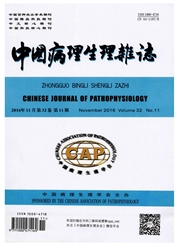

 中文摘要:
中文摘要:
目的:探讨PXD101(又称belinostat)诱导人前列腺癌PC3细胞凋亡的线粒体通路。方法:PXD101以不同刺激时间和剂量处理PC3细胞,CCK-8法检测细胞的活力;流式细胞术检测细胞的凋亡率和线粒体膜电位;Western blot检测线粒体凋亡相关蛋白Bcl-2、细胞色素C(Cyt C)和Bax;caspase-3活性检测试剂盒检测caspase-3活性。结果:PXD101能以时间和剂量依赖的方式抑制PC3细胞的存活(P〈0.05),流式细胞术检测结果表明PXD101处理后PC3细胞的凋亡率明显增加(P〈0.01)。PXD101能时间依赖性致线粒体膜电位降低和Bcl-2蛋白含量明显下降,Bax蛋白含量上升,促进线粒体释放Cyt C蛋白,caspase-3活性明显增强。结论:PXD101通过线粒体途径诱导人前列腺癌细胞系PC3细胞凋亡。
 英文摘要:
英文摘要:
AIM:To explore the mitochondrial pathway in the apoptosis of PC3 cells induced by PXD101 (also named as belinostat).METHODS: PC3 cells were treated with PXD101 at different doses or stimulated with PXD101 for different time. The effect of PXD101 on the viability of PC3 cells was measured by CCK-8 assay. The apoptotic rates and the mitochondrial membrane potential (MMP) were analyzed by flow cytometry. The protein levels of Bcl-2, Bax and cytochrome C (Cyt C) were determined by Western blot. The caspase-3 activity were tested by caspase-3 activity assay kit.RESULTS: The viability of the PC3 cells was inhibited by PXD101 in a dose-and time-dependent manner. Flow cytometric analysis showed that the apoptotic rates were increased in the cells treated with PXD101 (P〈0.01). At the same time, PXD101 induced the decreases in MMP and Bcl-2, the release of Cyt C, and the increase in caspase-3 activity.CONCLUSION: PXD101 induces the apoptosis of human prostate cancer cell line PC3 by mitochondrial signal pathway.
 同期刊论文项目
同期刊论文项目
 同项目期刊论文
同项目期刊论文
 期刊信息
期刊信息
